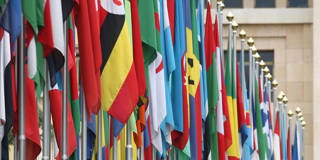All over the world, nationalist populists have successfully stoked anti-globalist sentiment among the people who would benefit the most from international cooperation. Countering this trend will require internationalists to clarify what global solidarity really means, beginning at the upcoming UN General Assembly.
WASHINGTON, DC – As the United Nations General Assembly gathers in New York City for its 75th session – which will open with a high-level meeting focused on “reaffirming our collective commitment to multilateralism” – the United States is engulfed in perhaps the most contentious presidential election in recent memory. The outcome will have far-reaching implications for the future of international cooperation and globalization.

WASHINGTON, DC – As the United Nations General Assembly gathers in New York City for its 75th session – which will open with a high-level meeting focused on “reaffirming our collective commitment to multilateralism” – the United States is engulfed in perhaps the most contentious presidential election in recent memory. The outcome will have far-reaching implications for the future of international cooperation and globalization.